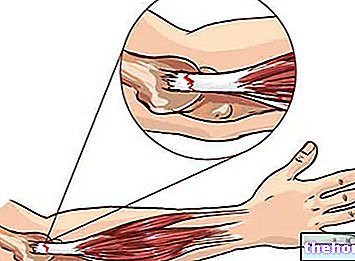RECAL ® is a calcium carbonate based drug
THERAPEUTIC GROUP: Mineral supplement: calcium carbonate

RECAL ® indications - Calcium carbonate
RECAL ® is useful in the prevention and treatment of calcium deficiency states and associated pathologies.
Mechanism of action RECAL ® - Calcium carbonate
RECAL ® is a calcium carbonate-based drug, useful in restoring the correct blood concentrations of this element.
In fact, calcium carbonate, introduced orally, quickly reaches the gastric environment where it is transformed into calcium chloride, then absorbed by the intestinal mucosa through both active transport processes and diffusion and facilitated transport.
In this way the calcium taken up by the enterocyte is appropriately distributed, through the circulatory stream, to the various tissues where it mainly intervenes in the control of cellular metabolic activities, in the control of bone turnover and in neuromuscular transmission.
Excess calcium will instead be eliminated through faeces, urine and sweat.
The whole process, from intestinal absorption to peripheral use, is finely regulated by hormonal factors such as paratoromone, calcitonin and vitamin D and by the lifestyle of the individual.
Studies carried out and clinical efficacy
1. CALCIUM AND PREMESTRUAL SYNDROME
Taiwan J Obstet Gynecol. 2009 Jun; 48: 124-9.
Effects of calcium supplement therapy in women with premenstrual syndrome.
Ghanbari Z, Haghollahi F, Shariat M, Foroshani AR, Ashrafi M.
The use of calcium has been shown to be important in reducing fatigue, altered appetite and depression which is frequently observed in women with PMS.
2. CALCIUM CARBONATE AND OSTEOPOROSIS
J Bone Miner Metab. 2011 Sep; 29: 552-60. Epub 2011 Jan 8.
Efficacy of calcium supplementation for human bone health by mass spectrometry profiling and cathepsin K measurement in plasma samples.
Zhao Y, Cao R, Ma D, Zhang H, Lappe J, Recker RR, Xiao GG.
The use of calcium carbonate in chewable tablets proved to be more effective than other forms in reducing blood concentrations of cathepsin K, an important blood marker of osteoporotic disease.
3. CALCIUM AND CARDIOVASCULAR HEALTH
J Bone Miner Res. 2011 Jan; 26: 35-41.
Calcium supplementation and the risks of atherosclerotic vascular disease in older women: results of a 5-year RCT and a 4.5-year follow-up.
Lewis JR, Calver J, Zhu K, Flicker L, Prince RL.
Study that disproves the toxic potential of calcium on cardiovascular health. In fact, in this study, supplementation with 1200 mg of calcium per day did not cause any type of change in the health of the main arteries.
Method of use and dosage
RECAL ®
Effervescent tablets of 2500 mg of calcium carbonate equal to 1000 mg of calcium:
the pological scheme generally used in the treatment of deficiency states provides for the intake of 1 g of calcium per day.
Variations in dosage may be made by your physician based on the needs of each individual.
The entire therapy must be supervised by your doctor.
RECAL ® warnings - Calcium carbonate
The intake of RECAL ® should be preceded by a medical examination useful to evaluate the patient's overall health status, and in particular the correct renal functioning.
Patients with impaired functionality of this organ are in fact more subject to the risk of hypercalcemia.
The correct management of the patient should also provide for periodic monitoring of calcium in order to ascertain the therapeutic efficacy.
PREGNANCY AND BREASTFEEDING
Both pregnancy and breastfeeding determine an increased need for calcium, which must necessarily be satisfied through a correct diet or with the help of dedicated supplements.
In the event that pregnant women and nurses have significant deficiencies in this element, the use of RECAL ®, under prescription and medical supervision, can be invaluable in restoring correct blood calcium concentrations.
Interactions
In order to maintain the pharmacokinetic characteristics of calcium carbonate taken orally unaltered, attention should be paid to the simultaneous intake of vitamin D and analogues.
Conversely, calcium could reduce the bioavailability of antibiotics such as tetracyclines when taken simultaneously or over the next 3 hours.
It should also be remembered that taking digitalis could increase the risk of heart rhythm disturbances.
Contraindications RECAL ® - Calcium carbonate
RECAL ® is contraindicated in case of hypercalcemia, hypercalciuria, nephrolithiasis, renal insufficiency and hypersensitivity to the active ingredient or to one of its excipients.
Undesirable Effects - Side Effects
Despite the treatment with calcium carbonate, it is safe and free of clinically relevant side effects when carried out according to medical indications, excessive dosages and protracted for a long time could facilitate the onset of hypercalcemia with consequent vomiting, constipation, crampy abdominal pain, polyuria, polydipsia, vasomotor and heart rhythm disturbances, associated with hypercalcemia.
Note
RECAL ® is a prescription drug
The information on RECAL ® - Calcium Carbonate published on this page may be out of date or incomplete. For a correct use of this information, see the Disclaimer and useful information page.




























